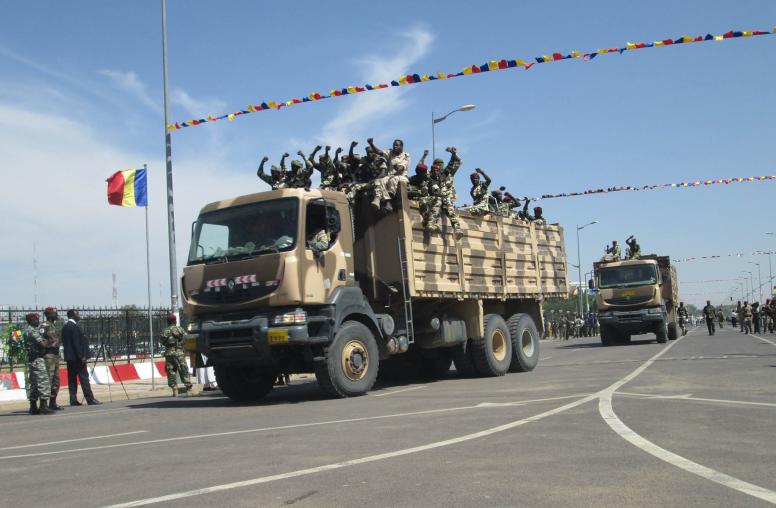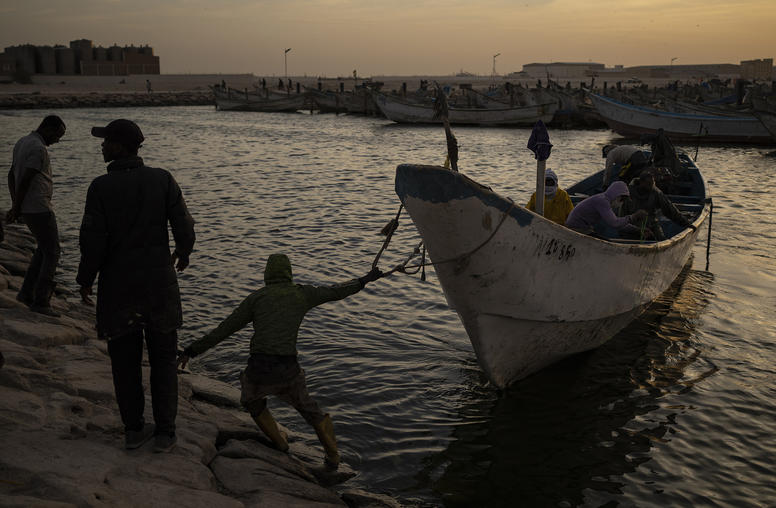Chad’s Political Transition at an Inflection Point
Constitutional referendum on December 17 will have implications for 2024 elections, peace and security.
On December 17, Chadians will vote in a referendum to approve a new constitution for the country nearly three years into a protracted, at times turbulent political transition process. The constitutional referendum is expected to pave the way for President Mahamat Déby to run for president in the 2024 national elections after leading the country since 2021, and adjust Chad’s system of governance to be a unitary, non-federal state with increased decentralization and territorial autonomy.

Referendum a Test for the Next Phase of the Transition
Since Chad’s then president Idriss Déby was killed during fighting with insurgents in 2021, Chad has been governed by a Transitional Military Council and subsequently a Government of National Unity led by Prime Minister Saleh Kebzabo, all under the helm of Déby’s son, Mahamat Déby. The president has promised to restore civilian rule.
Chad’s transition to civilian rule is now at an inflection point. The December 17 referendum can be seen as a test for the next phase of the transition and what general elections planned for October 2024 will look like. Citizens’ participation in the vote, civil unrest or violence, messaging from proponents and opponents of the new constitution, and government actions during and following the vote will be key factors to watch.
Chad’s transition period may be a lengthy one, and despite its flaws, the referendum offers three key lessons. First, on the importance of respect of transition timelines and key milestones — including the convening of a national dialogue and holding a constitutional referendum and elections. In contrast to transitional authorities in western Sahel, Chad’s leadership is advancing in the road map of its transition process, despite serious challenges, including instances of human rights abuses. Second, the importance of political and civic participation in debates on the form of the state — generated from Chad’s referendum process — is another lesson from Chad’s transition. Further civic engagement and debate on the role of the state and accountable, democratic governance will be essential in 2024. Third, on political space and consensus building, the referendum has created new alliances and space for dialogue although more needs to be done ahead of the 2024 elections.
International partners can recognize these important lessons as they accompany and encourage peaceful, democratic and inclusive transitions in countries experiencing coups. Chadian political leadership should proactively establish the foundations for peaceful and durable prosperity through credible debate and inclusive institutions, accountability to its citizens and genuine democratic reforms.
Background and Key Issues
The organization of the referendum is one of the outcomes of the 2022 National Dialogue convened by transitional authorities. The constitution-drafting process has been opaque from the outset, and critics point to a partisan-led referendum commission. Another source of contention for opponents and boycotters of the new constitution project centers on the form of the state it would adopt — that of a unitary state, neglecting opponents’ demands for widened territorial autonomy from N’Djamena through federalism — and overall lack of awareness by citizens of the significance of the vote. In other words, they describe a constitution project that the transitional government has “rammed through” with minimal input or buy-in from diverse Chadian constituents.
The new constitution plans for two-tiered decentralization, through local assembly elections and representation at the provincial level. Nevertheless, critics cite a historic trust deficit in governance and democratic elections, highlighting that while the 1996 constitution planned for decentralization at four levels, there were ultimately limited steps toward decentralization and territorial autonomy in practice.
The limited implementation of decentralization has been a major source of tension in Chad’s history, at least since the validation of the 1996 constitution. This tension is particularly palpable in southern Chad, where governors or mayors have often been ruling party representatives appointed by N’Djamena.
What the Referendum Means for Peace
A “Yes” victory for supporters of the new constitution is broadly seen as a fait accompli. Despite the frustrations and grievances generated by the process, Déby and Chad’s political leaders will still have opportunities to shape peace before and after the vote.
Peaceful management of the referendum and the post-referendum phase will be critical to mitigating risks of unrest domestically and reducing fragility in an already volatile region that is prone to armed conflicts, rising disinformation, intercommunal violence and the influence of malign actors, including extremist organizations and foreign mercenary forces.
Post-referendum, Chad’s political leaders can advance peace through reconciliatory gestures to opponents and boycotters of the constitution and foster reform through dialogue and consensus building, notably with the expected formation of a new government. Chad’s leadership can take concrete actions to build credible and transparent electoral institutions and restore trust in elections. The sustainable way forward will be to foster political inclusion and enable civic space and meaningful policy debate focused on underlying sources of tension — notably at the provincial and local level — and the need for inclusion, representation and participation of marginalized Chadian voices in decision-making.
Referendum Takes Place Amid Uncertainty
Chad’s transitional authorities have made some conciliatory gestures to appease tensions, such as the 2022 formation of an interim parliament, the National Transitional Council and the 2023 presidential pardons of hundreds of civil activists, protesters and rebels who had been imprisoned.
In November, leading opposition figure Succès Masra returned to Chad from a yearlong exile through an internationally mediated arrangement with the government. He had fled the country in the aftermath of crackdown and repression of protests in October 2022. Masra’s return constitutes a source for possible optimism with respect to political space, participation and consensus building ahead of the 2024 elections.
Still, Chad’s national referendum occurs amid uncertainty and tension, as evidenced by the recent suspension of political debate and discussion shows on public and private media outlets during the campaign, and intimidation of campaigners calling for a boycott of the referendum. Tensions around the referendum may entail risks of renewed civil strife, notably in N’Djamena and populated areas of southern Chad, as has been the case in other flashpoints of the transition. Meanwhile, insecurity continues to affect Chadian communities, especially in the south where access to land and politicians’ rent-seeking activities through cattle movements continue to be sources of friction and destabilization among local populations. In addition, there is the growing instability driven by the conflict in neighboring Sudan, which has resulted in an ever-increasing flow of refugees into eastern Chad.
Overall, civil society activists, opposition groups and citizens express increasing frustration at a system of governance which is seen as replica of Idriss Déby’s regime, with power and wealth concentrated in the hands of a few elites with close family links.
In addition to deep-seated issues of governance, territorial administration, elections and accountability, security sector reform is another “elephant in the room” for Chad’s stability going forward given citizens’ perceptions of disproportionate elite representation in the army. Despite the 2022 Doha agreement, in which the transitional government and political-military movements in Chad agreed to a “complete and definitive termination of acts of hostility,” the reemergence of armed groups in the north and renewed rumors of coups or intra-elite tensions are sources of concern.
The Role of International Partners
Following the July coup in Niger and amid ongoing war in Sudan, Chad is the only country in the wider Sahel region to have avoided losing territory to violent extremist groups, facing regional or international sanctions, and falling under the influence of the Kremlin and Wagner paramilitary group. In fact, Chad’s stability is seen as pivotal to confronting regional security threats.
The United States has been among the more vocal international partners in pressing for democratic reform and calling for respect for human rights and accountability in Chad. The United States is broadly seen as credible actor in the eyes of Chadian civil society and across the political spectrum.
Since 2021, the U.S. Institute of Peace has worked with civil society leaders, research institutions and women-led organizations to promote constructive debate and elevate citizen engagement in Chad’s political transition process.
The United States and other partners can continue to encourage Chadian authorities to make progress on several fronts while emphasizing their benefits of durable peace. These fronts include:
- Ensuring active civic participation in public affairs debates on the form and role of the state
- Building trust with citizens on democratic processes, including local and national elections
- Promoting political space and inclusion, with peaceful pathways for dialogue and consensus building, alliances and partnerships
- Developing credible and transparent electoral institutions at all levels, ensuring meaningful implementation of decentralization reforms and respect for transition milestones
- Fostering local civil society’s role and contribution to transition debates, including the voices of women and youth associations, religious authorities, media and thought leaders
- Avoiding intimidation or recourse to violence in the run-up to and after the referendum, and ensuring accountability for past and ongoing abuses.
Restoring Trust
In a region mired by significant instability — from a wave of coups d’états in the Sahel and war in Sudan to insecurity in the Central African Republic and state failure in Libya to the malign effects of great-power competition, including Russian and Chinese misinformation, disinformation and malinformation aimed at undermining Western powers’ influence — it is essential to preserve and sustain peace and security in Chad. It is equally important to recognize the lessons and challenges Chad’s political transition may offer to other countries in the region.
But long-term peace in Chad will be achieved through the establishment of credible and effective institutions, open and competitive electoral processes, increased space for political dialogue and civic engagement in the public sphere, and by addressing the underlying sources of tension at the local level.
Chad’s authorities can take concrete steps to restore trust with citizens and pave the way for meaningful inclusion in the last phase of the transition, after the expected adoption of the new constitution. It is critical to adopt a citizen-centric lens to understand sources of conflict in Chad and devise options to improve prospects for peace. It is not too late for Chad’s leaders to embrace this approach.



